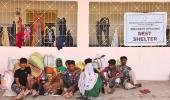Of some 70 villages in the coastal area of Gujarat's Kutch district, people of Salaya are the last to shift to safe shelters in the face of the approaching cyclone Biparjoy.

Besides appeals by the National Disaster Response Force (NDRF) and district officials, it was the sight of seawater entering the village persuaded them to vacate their houses a day ahead of the expected landfall of Biparjoy.
The village of Salaya near Mandvi has a population of 2,500, most of them fisherfolk.
"Seawater has already flooded the road between the village and the sea. We fear it will flood our village. We are worried about our children and that is the reason we have decided to shift to the safe shelters provided by the government," said Bhusar Yakub Tayyab, a local resident.
NDRF officer Rakesh Singh landed in the village on Wednesday and persuaded the locals to leave.
Despite efforts by the local administration since June 12, only around 150 villagers had shifted to the shelters until Tuesday evening.
The NDRF team oversaw the evacuation of remaining villagers which is expected to be completed by evening.
Hetal Soneji, president of Mandvi municipality under whose jurisdiction the village falls, was also present.
"People here are from the fisherfolk community and they know the sea well. As the water has reached the road, they understand the severe damage the cyclone can cause and are ready to go to the shelters. We have made all arrangements for food and comfortable stay in the shelters," she said.
The shelters have been set up some 15 km inland.
The president of the fishermen association of Salaya, Akbar Mandra, said they face evacuation on account of cyclone every four or five years.
"We have asked the administration to build an embankment wall around the village so that seawater does not enter and we do not have to face this situation again," he said.
Families including women and children were seen leaving the village, carrying valuables, in vehicles provided by the government or their own vehicles.
Some people have decided to stay back to protect their homes and belongings.
"In many families, one male member has decided to stay back," said one villager.











 © 2025
© 2025